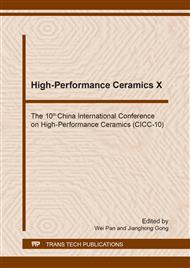p.859
p.865
p.872
p.878
p.887
p.893
p.900
p.906
p.912
P-Type Molecular Sieve Antibacterial Agent and Hydrothermal Control
Abstract:
P-type molecular sieve antimicrobial agents, which were grafted with potassium diformate using chitosan as an intermediat, were synthesized from hydrothermal process. The effects of hydrothermal process conditions (pH, reaction time, reaction temperature and mass ration of P-type molecular sieves: chitosan: potassium diformate) were investigated in detail. XRD, FTIR spectroscopy and SEM were applied to characterized the P-type molecular sieve antimicrobial agents. The antimicrobial performance of P-type molecular sieve antimicrobial agents were evaluated with the OD value and growth curve of Staphylococcus aureus. Atomic absorption spectrophotometer was introduced to measure the K+ concentration. Under the optimum synthesis condition of P-type molecular sieve antimicrobial agents (reaction temperature=50 °C, reaction time=3 h, and the mass ratio=3:1:2), the inhibitory rate of P-type molecular sieve antimicrobial agents was as high as 89%.
Info:
Periodical:
Pages:
887-892
DOI:
Citation:
Online since:
August 2018
Authors:
Keywords:
Price:
Сopyright:
© 2018 Trans Tech Publications Ltd. All Rights Reserved
Share:
Citation:


